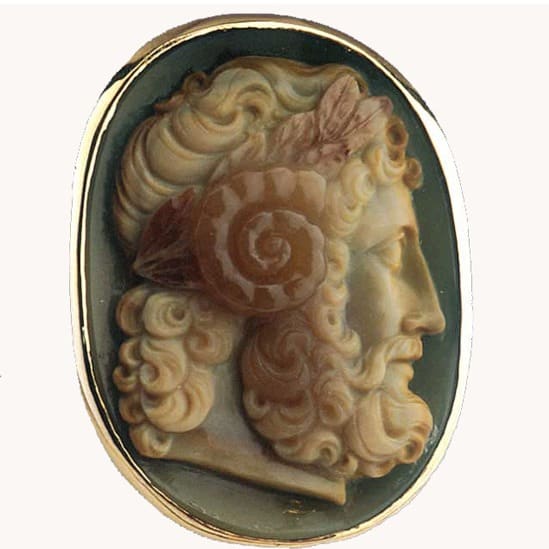Ring Featuring a Roman Cameo Depicting the Head of Zeus Ammon, 100 CE - 300 CE
Agate, Gold
FJ.6558
This cameo is set in an 18 Karat gold ring. Ammon is the Hellenized name of the great god of Egyptian Thebes, and thus identified with Zeus, the chief divinity...
This cameo is set in an 18 Karat gold ring.
Ammon is the Hellenized name of the great god of Egyptian Thebes, and thus identified with Zeus, the chief divinity of Greece. The Greek poet Pindar (born c. 518 H.C.) was the first lo compose a hymn to Zeus Ammon, and the cult attracted the interest of other great writers of the ancient world including Herodotus and Plutarch. The particular personification of the god, with ram’s horns, appears on coins from Cyrene (early 5t;h century RC.), similar in style to the image on this superb intaglio. The god's elegant profile is surrounded by a luxuriant growth of hair in waves around the laurel wreath, flowing in curls down the back as if i1J. a continuous stream into the lush curly beard. This sense of continuous movement and rhythm is heightened by the spirals of the ram' s horn. This image conforms to the idea of Zeus in his role as 'father', watching over his mortal children from the lofty summit of Mount Olympus.
Ammon is the Hellenized name of the great god of Egyptian Thebes, and thus identified with Zeus, the chief divinity of Greece. The Greek poet Pindar (born c. 518 H.C.) was the first lo compose a hymn to Zeus Ammon, and the cult attracted the interest of other great writers of the ancient world including Herodotus and Plutarch. The particular personification of the god, with ram’s horns, appears on coins from Cyrene (early 5t;h century RC.), similar in style to the image on this superb intaglio. The god's elegant profile is surrounded by a luxuriant growth of hair in waves around the laurel wreath, flowing in curls down the back as if i1J. a continuous stream into the lush curly beard. This sense of continuous movement and rhythm is heightened by the spirals of the ram' s horn. This image conforms to the idea of Zeus in his role as 'father', watching over his mortal children from the lofty summit of Mount Olympus.
